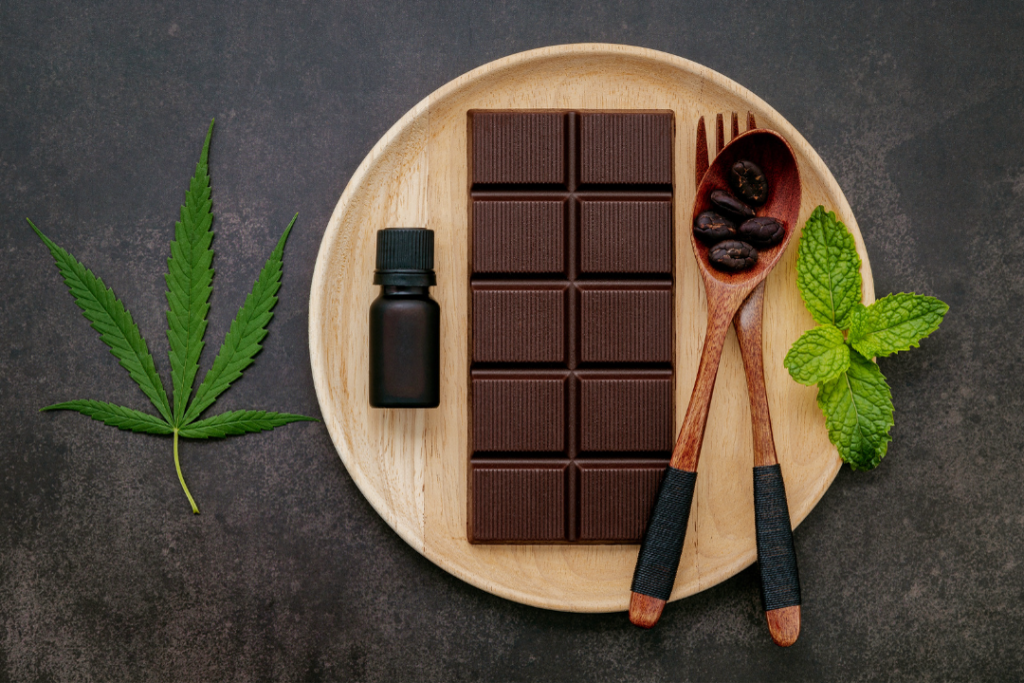Clients are able to receive a free 30-minute consultation with a company representative to get a better understanding of what they need.
Let Us Do the hard work for you
The Cannabis Act in Canada has established regulations for the manufacturing and distribution of cannabis products, including edibles. Understanding what is and what is not included in cannabis extract and how to classify edibles is essential for compliance.
Cannabis is a plant that has been used for its medicinal and recreational properties for thousands of years. With the legalization of cannabis in Canada, Health Canada has established regulations regarding what can and cannot be included in cannabis extracts, as well as how edibles are classified. In this article, we will explore the specifics of these regulations, what is and what is not included in cannabis extracts, and how edibles are classified according to the Cannabis Regulation.
Cannabis extracts have become increasingly popular due to their convenience and ease of use. However, it is important to understand what is and what is not included in these extracts, as well as how edibles are classified according to the Cannabis Regulation. Health Canada has established strict regulations to ensure the safety and quality of cannabis products, including extracts and edibles.


A cannabis extract is a concentrated form of cannabis that is made by extracting the active compounds, such as THC and CBD, from the plant. When it comes to the definition of cannabis extracts, Health Canada has provided guidance that states that any product produced through solvents or mechanical processes, such as sifting, beating, rubbing, or other mechanical actions, is considered a cannabis extract.
These extracts can come in various forms, like oils, tinctures, capsules, concentrates including kief and hashish.
Additionally, a mixture of dried cannabis and cannabis extract, such as a pre-rolled joint fortified with kief, is considered a cannabis extract product under the regulations. This is because the presence of the cannabis extract in the mixture changes its classification from dried cannabis to a cannabis extract.
This means that they must be produced by a licensed producer and comply with quality control standards to ensure that they are safe and free from contaminants.
The content of cannabis extracts is strictly regulated in Canada. According to section 101.3 of the Cannabis Regulations, extracts used in cannabis products or accessories must only contain carrier substances, flavoring agents, and substances necessary for quality and stability.
This means that any other ingredient is prohibited, including sugars, sweeteners, and substances listed in column 1 of Schedule 2 to the Tobacco and Vaping Products Act.
However, vitamins may be used in small amounts to maintain quality. Ingredients used for extraction may contain naturally occurring substances, but only at levels that are not above the naturally occurring level for that ingredient.
Inhaled extracts must comply with standards set out in Schedule B to the Food and Drugs Act, and ingested extracts must not contain more than 7.5g of cannabis extract per container. Cannabinoids and terpenes must be uniformly distributed throughout the extract or topical, as per section 101.4.
Finally, according to section 101.5, cannabis extracts or accessories must not be represented for use on external body surfaces, including hair and nails. This list of regulations and restrictions is in place to ensure the safety and quality of cannabis extracts in Canada.
Permitted Ingredients | Prohibited Ingredients | Exceptions |
|---|---|---|
| 1. carrier substances, 2. flavoring agents, and 3.substances necessary for quality and stability | 1. Amino acids 2. Caffeine 3. Colouring agents 4. Essential fatty acids 5. Glucuronolactone 6. Probiotics 7. Taurine 8. Vitamins 9. Mineral nutrients | vitamin may be used as an ingredient to maintain the quality or stability of the cannabis extract if it is used in an amount that does not exceed what is necessary to maintain the quality or stability of the cannabis product. |
| Cannabis extracts intended to be inhaled must not contain any ingredients in addition to flavouring agents, unless a standard for the ingredient is set out in a publication referred to in Schedule B of the Food and Drugs Act, and the ingredient adheres to that standard. | 1. sugars 2. sweeteners 3. Sweeting Agents | An ingredient used to produce cannabis extract, such as carrier substances, flavoring agents, and substances necessary for quality and stability, may contain a prohibited substance only if that substance occurs naturally in the ingredient at a level that is not above the naturally occurring level for that ingredient. |
| Any cannabis extract product, or any cannabis accessory containing a cannabis extract, cannot be represented for use on external body surfaces such as hair or nails. | cannabis extracts must not contain ethyl alcohol unless they are intended to be ingested and the net weight of the extract in each container does not exceed 7.5 g. |
As the legalization of cannabis continues to sweep across the globe, more people are exploring alternative ways to consume cannabis. One popular method is through edibles, which are foods infused with cannabis. Edible cannabis products come in different forms, including gummies, chocolates, baked goods, and beverages.

It is important to note that the ingredients used in edible cannabis are highly regulated to ensure consumer safety. Here’s what you need to know about the ingredients in edible cannabis:
According to Canadian regulations, edible cannabis must not contain any ingredients other than food and food additives. This means that edible cannabis must be made from ingredients that are safe for human consumption, such as flour, sugar, butter, and oils.
Temporary marketed foods and supplemented foods are not allowed to be used as ingredients in edible cannabis. Temporary marketed foods are products that have been authorized for sale in Canada on a temporary basis. Supplemented foods are products that contain added vitamins and minerals.
Meat, poultry, and fish are not allowed to be used as ingredients in edible cannabis unless they meet certain conditions. For example, they must be produced by a person authorized to produce them under Canadian laws or the Safe Food for Canadians Act. Additionally, they must have a water activity level that does not exceed 0.85 at a temperature of 22 ± 2°C.
A holder of a processing license may use self-produced food as an ingredient in edible cannabis, as long as the food is not a meat product, poultry product, or fish. Additionally, the sale of the food must not be prohibited under section 4 of the Food and Drugs Act.
Food additives may be used in edible cannabis, but only if they meet certain conditions. For example, the food additive must be permitted in the food that the edible cannabis is based on, and the conditions under which the food additive is permitted must be followed. Additionally, the food additive cannot be caffeine or caffeine citrate.
Vitamins and mineral nutrients may only be used as ingredients in edible cannabis if their use is permitted under the same conditions as food additives.
Caffeine in Edible Cannabis
Edible cannabis that is a cannabis product must not contain or have on it caffeine unless:
In conclusion, understanding the ingredients used in edible cannabis is crucial for ensuring consumer safety. The Canadian regulations on edible cannabis ingredients are strict, and it’s important to comply with them to produce high-quality, safe products. As with any cannabis product, it’s important to start with a low dosage and wait for the effects before consuming more.

In conclusion, the Cannabis Act has established regulations for the manufacturing and distribution of cannabis products in Canada, including edibles and extracts. It is essential to understand what is and what is not included in cannabis extracts, as well as how edibles are classified according to the Cannabis Regulation, to ensure compliance with these regulations. The content of cannabis extracts is strictly regulated, and only carrier substances, flavoring agents, and substances necessary for quality and stability are permitted. Edible cannabis must be made only from ingredients that are safe for human consumption, and temporary marketed foods and supplemented foods are prohibited. These regulations have been put in place to ensure the safety and quality of cannabis products in Canada
MFLRC provides educational materials to help businesses understand the regulations, as well as guidance for labeling and packaging products. We also support product testing that meets regulatory standards, so you can ensure your products are safe for consumers. With our detailed information and resources, we make it easier to stay compliant with Canadian cannabis laws. Contact us today to learn more about how MFLRC can help you navigate the new regulatory landscape.
Our team of experts is always available to answer questions and provide consultations on any aspect of cannabis laws, from procurement processes to labeling requirements. We take the time to understand your specific needs and develop tailored solutions that meet your business objectives while remaining compliant with Canadian regulations.
Cannabis product means cannabis of only one of the classes set out in Schedule 4 to the Act — or a cannabis accessory that contains such cannabis — after it has been packaged and labelled for sale to a consumer at the retail level. It does not include
Non-solids containing cannabis means substances that are in non-solid form at a temperature of 22 ± 2°C and that have a concentration of 3% w/w or less of THC, taking into account the potential to convert THCA into THC.
Solids containing cannabis means substances that are in solid form at a temperature of 22 ± 2°C and that have a concentration of 3% w/w or less of THC, taking into account the potential to convert THCA into THC.
cannabis concentrate means a substance that has a concentration of greater than 3% w/w of THC, taking into account the potential to convert THCA into THC.
Glycerin is classified as an active pharmaceutical ingredient (API) by the Food and Drug Regulations of Canada. It is also used as an excipient, which is a substance that is added to a medication to help deliver the API to the body.
In Canada, glycerin is regulated by Health Canada’s Therapeutic Products Directorate (TPD), which ensures that all drugs, including APIs and excipients, are safe, effective, and of high quality. The TPD sets standards for the manufacturing, testing, and labeling of pharmaceutical products, and glycerin must meet these standards in order to be approved for use in medications.
Additionally, glycerin is also used in food products and is classified as a food additive by Health Canada’s Food Directorate. It is approved for use in a variety of food products, including baked goods, candies, and soft drinks, as long as it meets certain specifications and is used in accordance with Good Manufacturing Practices (GMPs).
Under cannabis regulations, sublingual products are typically classified as “edibles” or “oral products.” These products are designed to be placed under the tongue and absorbed through the sublingual gland, which can provide rapid and efficient absorption of cannabis compounds into the bloodstream. Sublingual products may come in the form of oils, tinctures, sprays, or lozenges, and can be formulated with different ratios of THC and CBD to provide various effects. It is important to note that cannabis regulations can vary by jurisdiction, so specific classifications may differ depending on the location.
Under the Cannabis Act and Regulations in Canada, sublingual products that are formulated with concentrated cannabis extracts can be classified as extracts. This is because extracts are defined as products that contain cannabis compounds obtained through a process that uses a solvent, which can include sublingual tinctures or oils that are produced using solvents like ethanol or CO2.
However, it’s important to note that the classification of sublingual products may depend on the specific formulation and method of production, as well as the specific regulations of the jurisdiction in question. It’s always recommended to check the regulations and guidelines provided by Health Canada or your local regulatory body to determine the classification of specific cannabis products.
Under the Cannabis Act and its regulations in Canada, extracts are defined as products that are obtained or derived using a solvent or other means of separation to isolate active ingredients from cannabis. This includes products such as concentrates, oils, and capsules [1].
Lozenges and strips, on the other hand, are solid forms of cannabis products that are intended to be dissolved slowly in the mouth or placed under the tongue for sublingual absorption. While these products may contain extracts, they are not classified as extracts themselves.
However, it is worth noting that the classification of cannabis products under the Cannabis Act and its regulations can be complex and may vary depending on factors such as their intended use, method of consumption, and formulation. It is important for individuals and businesses operating in the cannabis industry to stay up to date on the regulations and consult with legal experts to ensure compliance.
In summary, while lozenges and strips may contain extracts, they are not classified as extracts under the Cannabis Act and its regulations.
It is unclear whether cannabis strips can be classified as extracts under the Cannabis Act and its regulations as it depends on the specific formulation and production method of the strips. The classification of cannabis products under the regulations is based on their composition, production method, and intended use. While some cannabis strips may be classified as extracts, others may not meet the criteria for this classification. It is important to consult with legal and regulatory experts to determine the appropriate classification for a specific cannabis product.
No, cannabis gummies cannot be classified as extracts under the Cannabis Act in Canada.
Extracts are cannabis products that have been made by extracting and concentrating the active compounds, such as THC or CBD, from the cannabis plant. Examples of extracts include oils, tinctures, and shatter.
Cannabis gummies, on the other hand, are considered edible products. They are made by infusing cannabis extracts, such as THC or CBD, into a gummy candy base.
While both extracts and edibles contain cannabis extracts, they are classified differently under the Cannabis Act regulations. This is because extracts and edibles have different production processes, potency limits, and labelling requirements.
It’s important for licensed producers and retailers to accurately label and classify their cannabis products according to the regulations to ensure that they are safe and of high quality. Consumers should only purchase cannabis products from licensed retailers and should always read the product labelling to ensure that they are getting a legal and safe product.
MFLRC is a one-stop shop for all of your Licensing, quality assurance and compliance needs. Our team has years of experience in the cannabis industry and are experts in all facets. We offer a variety of services that will save you time and money. Let us take the burden off your shoulders so you can focus on what’s important – growing your business.
Contact us Now!
Mussarat Fatima, President, and owner of MF Cannabis License and Regulatory Consultants has more than twenty years of experience in Quality Assurance, Quality Control, and Regulatory Affairs within the pharmaceutical, Food and Cannabis industries. She has a Master’s Degree in Food Sciences and Biochemistry; in addition to this, she also has a diploma in pharmaceutical Quality Assurance, Regulatory Affairs, and Quality Control. Also, she has completed several certifications specifically in Cannabis Quality Assurance, Regulatory Affairs, and Facility management from recognized institutes in Canada.

Written By: Mussarat Fatima
President at MF License & Regulatory Consultants
Website: https://mflrc.com/
Contact: info@mflrc.com